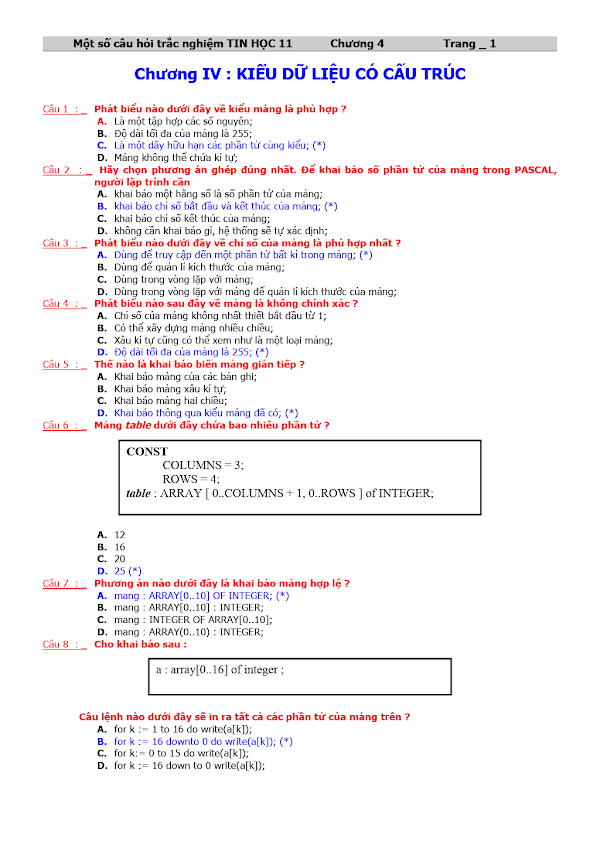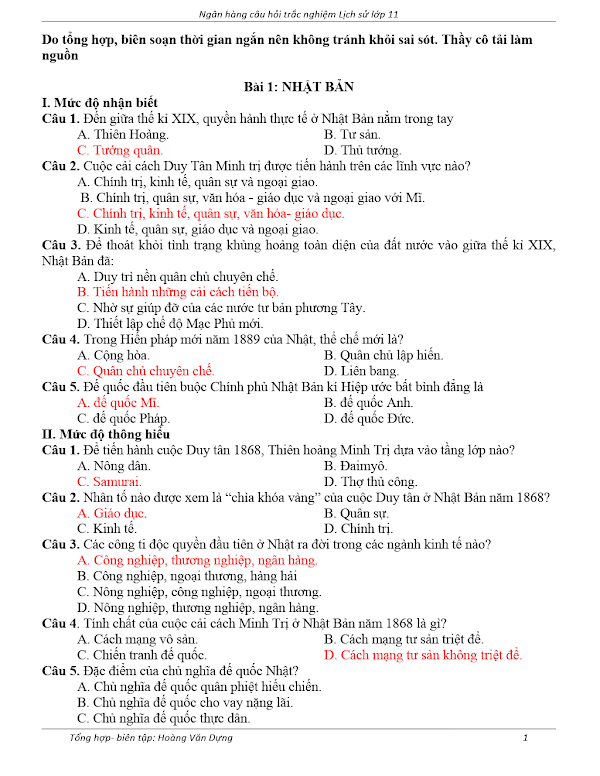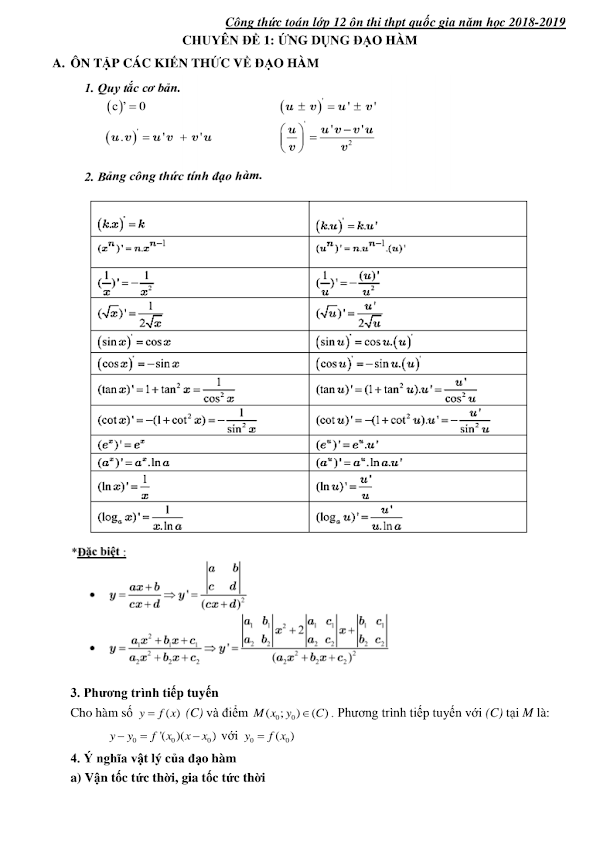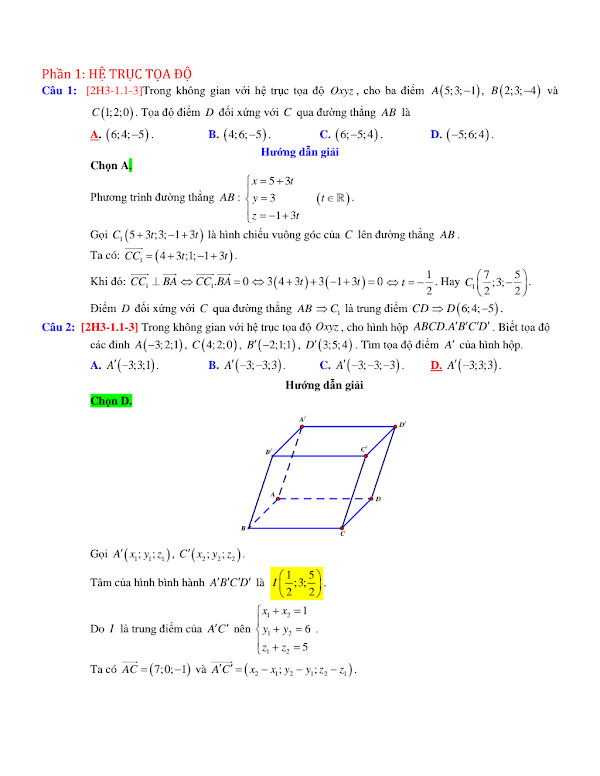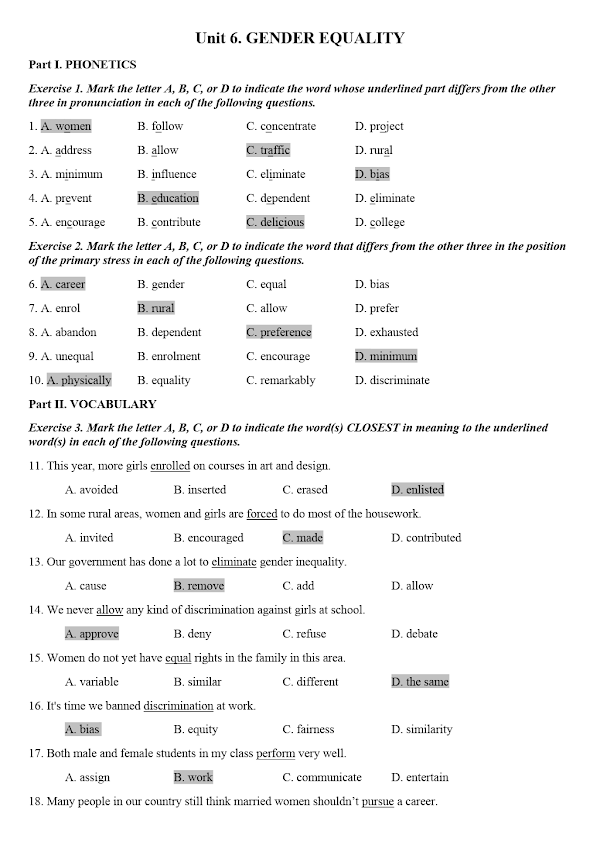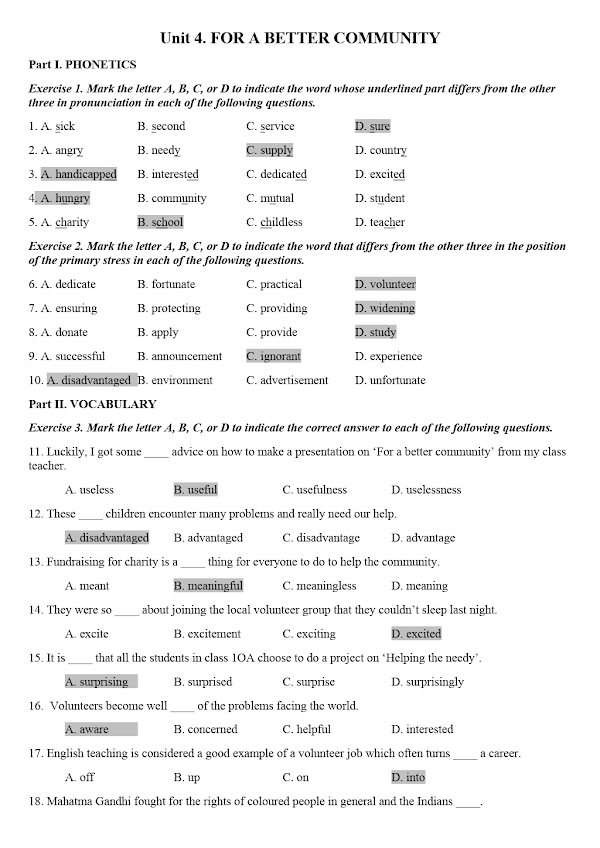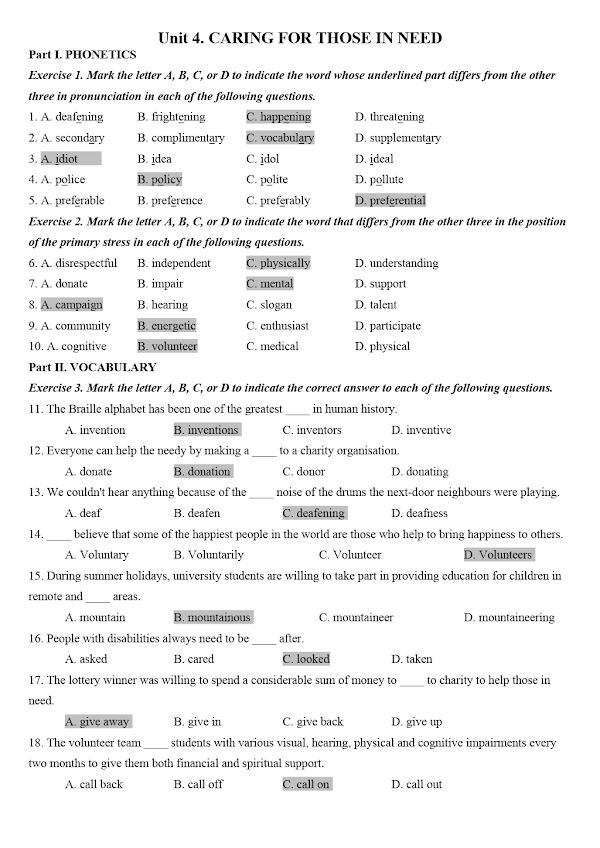GRAMMAR FOR ADVANCED LEARNERS - ADVERBS
Chào các bạn học sinh và quý thầy cô, hôm nay LogaVN gửi tới bạn đọc tài liệu "GRAMMAR FOR ADVANCED LEARNERS - ADVERBS". Hi vọng sẽ giúp ích cho các bạn học tập và giảng dạy.
GRAMMAR FOR ADVANCED LEARNERS
ADVERBS
Adverbs are words which modify or give extra information about verbs, adjectives, other words or whole clauses. Let’s examine the form and use of adverbs, including adverb pairs with very similar forms, as well as adverbs and adjectives with the same form. We also look at the position of adverbs which modify verbs and at those adverbs which convey a viewpoint or attitude, or modify a whole sentence.
FORM
A. FORM OF ADVERBS.
Some adverbs are not derived from other words, while others are formed by adding suffixes to other words, or are formed from groups of words. These are some common examples of adverbs (note spelling):
not formed from other words: just, well, soon, too, quite, still
fixed phrases kind of, of course, at last
formed from other words
* adjective + ly: tragic => tragically, excitable => excitably,
easy => easily, real => reall
* noun/preposition +
-ward(s)/-wise home => homeward, after => afterwards, price =>
pricewise, health => healthwise
* compounds some+times => sometimes
B. CONFUSING FORM. ln some cases adverbs have the same forms as adjectives; in other cases two different adverbs are derived from the same adjective:
Adverbs which have the same form as adjectives:
close, deod, fost, fine, long, low, pretty, short, straight, wide, wrong
Common adverbs from the same base, with different meaning
direct (= without stopping)
- We flew direct from La Guardia to Houston.
late (= not on time/not earl')
- The plane arrived late due to bad weather.
Thẩm Tâm Vy, July 24th, 2019 GRAMMAR FOR ADVANCED LEARNERS ADVERBS
GRAMMAR FOR ADVANCED LEARNERS
ADVERBS
Adverbs are words which modify or give extra information about verbs, adjectives, other words or whole clauses. Let’s examine the form and use of adverbs, including adverb pairs with very similar forms, as well as adverbs and adjectives with the same form. We also look at the position of adverbs which modify verbs and at those adverbs which convey a viewpoint or attitude, or modify a whole sentence.
FORM
A. FORM OF ADVERBS.
Some adverbs are not derived from other words, while others are formed by adding suffixes to other words, or are formed from groups of words. These are some common examples of adverbs (note spelling):
not formed from other words: just, well, soon, too, quite, still
fixed phrases kind of, of course, at last
formed from other words
* adjective + ly: tragic => tragically, excitable => excitably,
easy => easily, real => reall
* noun/preposition +
-ward(s)/-wise home => homeward, after => afterwards, price =>
pricewise, health => healthwise
* compounds some+times => sometimes
B. CONFUSING FORM. ln some cases adverbs have the same forms as adjectives; in other cases two different adverbs are derived from the same adjective:
Adverbs which have the same form as adjectives:
close, deod, fost, fine, long, low, pretty, short, straight, wide, wrong
Common adverbs from the same base, with different meaning
direct (= without stopping)
- We flew direct from La Guardia to Houston.
late (= not on time/not earl')
- The plane arrived late due to bad weather.
high (= to a great height)
- He lifted it high over his head.
hard (= with a lot of effort/severelyJ
- He braked hard when he saw the cat.
right (= direction/correctly)
- Turn right at the crossroads.
- Try to do it right this time!
free (= without paying)
- We got into the concert free!
deep = to a great depth/distance)
- We explored deep into the jungle.directly (= immediately/very soon)
- Don't go. I'll be with you directly.
lately = recently)
- She's been rather ill lately.
highly (= extremely)
- Arsenic is highly toxic.
hardly (= scarcely, almost not)
- We hardly know our neighbours.
rightly (= correctly in my opinion)
- The tribunal rightly condemned the war criminals.
freely (= without limitation or control)
- Sheep roam freely over the hills.
deeply (= thoroughly)
- I'm deeply ashamed of my behaviour.
There are a few adjectives which look like adverbs, e.g. friendly,lonely, cowardly.
We cannot make these adjectives into adverbs in the usual way. We use alternative words or phrases, or the adjective with manner or way:
- He left cowardlyly, sneaking out the back door.
=> He left like a coward ... => He left in a cowardly way ...
We use some common adjectives as adverbs in informal conversational English, although some speakers consider this incorrect:
- They sell things very cheap in that market.
In informal US English real and good can be used instead of really and well:
- She’s a real nice girl. The team's running good this season.
USE
A. Modifying, and adding information
The most common use of adverbs is to modify adjectives; the adverb usually comes before the adjective:
- I thought his answers were pretty good on the whole.
Some adverbs, e.g. really, almost, quite, pretty, can modify another adverb:
- The French team did really well in the first round.
Certain adverbs, e.g. quite, roughly, about, approximately, can also modify following
noun phrases, prepositional phrases and numbers:
- Her news came as quite a shock.
- In our school roughly fifty students have mobile phones.
A key use of adverbs is to add information about the time, manner or place of an action or state described in a sentence:
- He hit the ball hard and this time it flew into the back of the net.
Note that we can use noun phrases (this time) and prepositional phrases (into the bach
of the net) as adverbs.
We can use adverbs with as, so, too, enough, etc.:
- She performed so enthusiastically that the judges overlooked her inexperience.
- We missed the bargains because we didn't get there soon enough.
Some adverbs are used in conversation to show the speaker's attitude.
B. Using adverbs in comparisons
We can use adverbs in comparatives and superlatives, usually with more and most:
- In the lottery draw red balls seem to come up more frequently than yellow ones.
- Of all the relatives at Gran's funeral I think Uncle Ralph felt her loss most deeply.
Adverbs which do not end in -ly take the same comparative and superlative forms as adjectives .
- If you tuned the engine more often the car would go faster.
Note that the comparative and superlative forms of the adverb well are better and best.
POSITION OF ADVERBS IN SENTENCES
A. The three positions.
The position of an adverb depends on its meaning and the word or phrase it is modifying. Adverbs which modify adjectives, other adverbs and noun phrases have fixed positions, but adverbs which modify a verb or add information about how, when or where something happens can take several positions in a sentence.
We call these 'front position' (before the subject), 'mid position' (next to the verb) and 'final position' (after the object or complement):
front mid final
These days I probably take my health much more seriously.
If the object or complement of a verb is very long we can put a final position adverb before it:
- These days I take much more seriously all those things I used to take for granted.
B. We can use many adverbs in this position. We often use adverbs which link or contrast with information in the previous sentehce:
- I've been incredibly busy this week. Yesterday I worked more than twelve hours.
After negative adverbs (e.g. never), or after adverbs of time and place followed by a verb of movement or position, we put the verb before the subject (= inversion).
- Never have I seen such a disturbing sight.
- Here lies the body of our late lamented sovereign.
We do not use adverbs of definite frequency, e.g. daily, weekly, in front position:
- Monthly I get paid. => I get paid monthly.
C. This is the usual position for adverbs of indefinite frequency, adverbs of degree,
* adverbs of certainty, one-word adverbs of time, even and only.
* adverbs of indefinite: alwags, frequently, generally, hardly ever, never, normally,
* frequency: occasionally, often, rarely, seldom, sometimes, usually
* adverbs of degree: absolutely, almost, completely, entirely, just, hardly, partly,
quite, rather, reallg, slightly, totally
* adverbs of certainty: certainly, definitely, probably
* one-word adverbs of time: already, finally, immediately, just, now, no longer,
soon, still, then
With a simple verb we put the adverb between the subject and the verb, but with simple forms of be the adverb goes after the verb:
- She arrives always by taxi and she always is on time.
=> She always arrives by taxi and she is always on time.
If there is a modal or auxiliary verb we put the adverb after the (first) auxiliary verb:
- We've never been to the Greek islands. You can just see the coast.
- Sea eagles have occasionally been seen around Loch Lomond.
These adverbs go after do or not:
- They don't really understand my point of view.
But we put sometimes, still, certainly, definitelg and probably before a negative auxiliary:
- I don’t sometimes understand his arguments. He hasn’t still convinced me.
=> I sometimes don't understand his arguments. He still hasn't convinced me.
In spoken British English, if we want to emphasise an auxiliary verb or a simple form of be, we can put a mid-position adverb before it. The auxiliary/verb (underlined) is usually stressed:
- You really don't understand me at all! But she never is on time!
Compare:
- I don't really like him. (unmarked position = I slightly dislike him.)
- I really don't like him. (emphatic position = I hate him.)
We can do this in US English even when we are not emphasising the verb:
- Madonna never has been shy of image changes.
We do not use other time adverbs (definite time or frequency) in mid position:
- We everyday buy our lunch at that sandwich bar on the corner.
But we can do this in news reports:
- The Federal Reserve today announced an immediote rise in interest rates.
D. FINAL POSITION. The most frequent position for adverbs in English is the end of the sentence. It is the usual position for yet, a lot, any more, any longer, too, as well:
- They aren’t anynore selling it. => They aren't selling it any more.
We usually put adverbs of manner (which describe how something is done) and adverbs of definite frequency in this position:
- He well plays the guitar. => He plays the guitar well.
Adverbs of manner which end in -ly (except badly) can go in final or mid position:
- Harry painstakingly counted out the coins and arranged them neatly into piles.
We don't use hardly ever or never in final position:
- They watch tetevision hardly ever. => They hardly ever watch television.
If we put often, rarely and seldom in final position, we must use very or quite:
- These days I eat desserts rarely => These days I eat desserts very rarely.
If there are several adverbs in final position, we usually follow a sequence of adverbs of manner, then place, and finally time:
- The statue was lifted carefully into the plinth before the ceremony.
SENTENCE ADVERBS
A. VIEWPOINT ADVERBS. Adverbs can describe the particular aspect of something we are commenting on:
- Economically, the current government has been a resounding success. (= The
government has successfully managed the economy.)
- Atthough economically successful, the government is starting to lose popularity.
B. ATTITUDE / SENTENCE ADVERBS. Adverbs such as clearly, honestly, obviously, surprisingly, understandably can express our attitude towards an action:
- You've obviously been eating too many sweets, young man! (This is a logical deduction which is clear to anybody.)
We can also use these adverbs in conversation to introduce, extend, or make a comment on a topic or opinion. We usually put these 'sentence adverbs' at the front or end of the sentence, separated by a comma:
- Incidentatly, I noticed they were looking for new players down at the Red Lion.
- I don't think he knows what he's talking about, frankly.
There are a number of these adverbs where the meaning is not always obvious:
adverb meanings
admittedly This probably qualifies or contradicts what I have just said/heard.
apparently This is something I believe to be true or have heard, although l'm not
certain it is correct.
fortunately This is something positive which contrasts with something else I have
said/heard. I am pleased about this.
frankly This is my true opinion, although it may be shocking.
incidentally I am changing the subject - this is some information which is not
directly .
by the way connected with the previous information.
understondably One can sympathise with this.
Some adverbs, e.g. naturally and clearly, can be used as sentence adverbs and also
as adverbs of manner. Note the different meanings:
- Despite being in a zoo, the animals behaved quite naturally. (= in a natural way)
- Naturally, wild animals behave quite differently in captivity. (= what is expected)
- The teacher answered the question clearly and precisely. (= in a clear way)
- Clearly, the teacher didn't answer the question. (This is obvious.)
PRACTICE
I. Underline the correct option in italics.
1. He slapped him friendly / in a friendly way on the back.
2. Does that flight go direct / directly or is there a stopover?
3. Many of the senior staff are right / rightly concerned about their pensions.
4. There's been a lot of talk about European integration late / lately.
5. Our new cellphone fits easy / easily into the average-sized pocket.
6. The path leads straight / straightly to the front door.
7. Healthy / Healthwise, stress is probably the most serious problem facing people today.
8. Animals are now able to wander free / freely throughout the game reserve.
9. In late spring the gulls nest high / highly on the cliff face.
10. The remains of the Spanish galleon lie deep / deeply under the ocean.
11. The minister will begin by giving a statement. After / Afterwards, you will be able to put your questions to him directly.
12. Jackson came pretty close / closely to winning that last race.
13. You'll never get better if you don't eat - you've hard / hardly touched your dinner!
14. In the Denver play-offs the Miami team did real /good well.
15. Some of these kids drive their cars far too fast / fastly.
II. Complete the second sentence so that it has a similar meaning to the first sentence. You must use between three and six words, including the word given in bold. This word must not be altered in any way. The exercise begins with an example (O).
0. Karen did really well in the test.
highly Karen was highly successful in the test
1. The car started to accelerate as we turned the corner.
go As we turned the corner the car..............
2. She really didn't expect to win so much money.
quite Winning so much money came .............. surprise
3. Evolution is slower during periods of climatic stability.
happens Evolution ..........during periods of climatic stability
4. We didn't get there in time to hear the overture.
soon We wanted to hear the overture but we didn't get............
5. More or less three-quarters of our students are fee-paying these days.
roughly These days .... our students pay free.
6. In the USA only a few people have heard of our products.
entirely Our products are ..........in the USA.
7. She gave such a moving performance that we were virtually in tears.
so She performed .............. we were virtually in tears
8. Mr Skidmore had a deeper involvement than any of the other directors.
most Of all the directors, Mr Skidmore was ............
9. In terms of politics, I felt most of the participants were biased.
politically In my opinion most of the participants ........
10. I couldn't have made my answers to the questionnaire any more honest than ldid.
as I answered the questionnaire ................ I could.
III. Tick () all those adverbs which can complete the sentences and cross (X) those that cannot. In one case none of the adverbs will fit.
1. Clarice.......opened the door to the secret compartment.
A. slowly B. last week C. probably
2. We don't........know the identity of the masked stranger.
A. still B. really C. certainly
3. You can........see the coast from this point.
A. definitely B. just C. as well
4. Our next door neighbours go there.......
A. as well B. hardly ever C. a lot
5. .......the boss gives me a hard time.
A. Every day B. Daily C. Sometimes
6. I get the feeling you haven't.......understood my point.
A entirely B. really C. probably
7. The public don't.......respond in the ways advertisers expect them to'
A. sometimes B. any longer C. always
8. I haven't been to the cinema........
A .yet B. often C. very often
9. Alarming signs of radiation leakage have been.......reported around the power station
A. often B. this week C. always
10. ..........have I been subjected to such outrageous demands.
A. Never B. Rarely C. Frequently
11. I'm afraid the bank does not..........permit such large overdrafts
A. generally B. any longer C. any more
12. The patient..........reacts to any kind of bright light.
A. badly B. immediately C. usually
13. He plays the saxophone..........
A. too B. quite rarely C. never
14. The data from those sensors isn't..........reliable.
A. absolutely B. sometimes C. always
15. She treats her children..........
A. carefully B. well C. badly
IV. Rewrite these sentences putting the words and phrases in brackets in the best order. Note that none of these sentences are emphatic. The exercise begins with an example (0).
0. Mv parents (allowed / hardly ever) us to (late/ on weekdays / stay.up).
=> My parents hardly ever allow us to stay up late on weekdays.
1. Taking advantage of a gap between the players, Owen kicked the ball (into the net/just before half time/skilfully)
.................................................................................................................................
2. Foxes (often/be seen/can) scavenging (on the streets of London/at night)
.................................................................................................................................
3. David (well/behaves/quite) when he is at home but he (at school/causes trouble/often)
.................................................................................................................................
4. The post (arrive/sometimes/on time/doesn't) in this part of the city.
.................................................................................................................................
5. Jennifer (immediately/didn't/recognise) the man waving (at the end of the show/frantically/from the Balcony).
.................................................................................................................................
6. We (unable/arelusually) to offer refunds on the spot, but we will examine (thoroughly/before the end of the week/your claim).
.................................................................................................................................
7. These children (never/have/given/been/probably) the opportunities we all take for granted.
.................................................................................................................................
8. Access to the lnternet (no longer/is) available (on weekday mornings/free of charge/at our libraries).
.................................................................................................................................
9. Such losses (have/would/normally/avoided/been) by the use of back-up devices.
.................................................................................................................................
10. Many of the old masters had assistants who would prepare the oil pigments (each morning/by hand/in their studio).
V. Make the answers in these mini-dialogues more emphatic by rewriting them with the adverb in brackets in a suitable position. Make any other changes that are necessary. The exercise begins with an example (0).
0. 'Lucy hasn't turned up yet again.'
'I know. She is unreliable, isn't she?' (really)
=> I know she really is unreliable, isn’t she?
1. 'Admit it. You took that money out of the till.'
'I'm sorry. I don't know what you are talking about!' (really)
2. 'How ridiculous! They can't fit us in on Saturday because they're full.'
'But that place is full on Saturday evenings!' (always)
.......................................................................
3. 'Isn't it strange that he never mentions his wife. Don't you wonder why?'
'Yes, I have wondered about that.' (often)
.......................................................................
4. 'Laurence won't even let us discuss your proposal.'
'I'm not surprised. He doesn't listen to my ideas.' (never)
.......................................................................
5. 'How bizarre. The customs officer really went through my luggage with a fine-tooth comb!'
'That's not unusual; the customs officers are quite thorough.' (usually)
..............................

